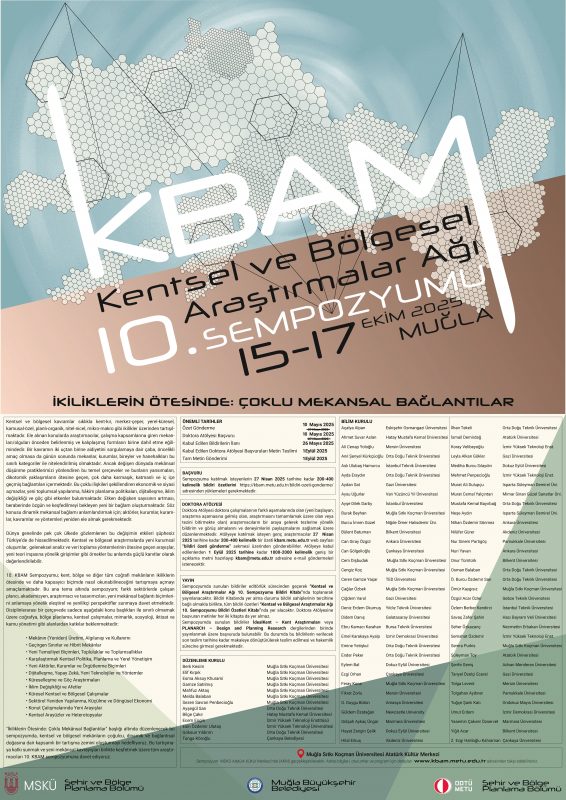10th Urban And Regional Research Network Symposium
10th Urban And Regional Research Network Symposium
BEYOND DUALITIES: MULTI-SPATIAL CONNECTIONS
OCTOBER 15-16-17 2025, MUĞLA SITKI KOÇMAN UNIVERSITY
Urban and regional concepts are often discussed through dualities such as urban-rural, center-fringe, local-global, planned-organic, public-private, quantitative-qualitative, and micro-macro. Researchers tend to assign spaces and notions covered in their study to one of the premeditated and stereotyped categories. Spaces, institutions, households and individuals are eventually qualified with one of these limited categories, even though the effort of questioning the belongingness of a concept to either one of the dualities is not the prior motivation. In fact, these fundamental frameworks and their reflections that have been guiding spatial thinking practices in an ever-changing world comprise more complicated, layered, and intertwined connections beyond dichotomic approaches. The factors shaping these multiple connections include economic and political conundrums, new societal structures, dominant planning policies, digitalization, climate change, and migration. The increase in related factors brings along a new context that is looking forward to being discovered. In order to interpret the dynamic spatial context in question, there is a need to reconsider actors, institutions, theories, concepts and methods.
The influences of this reconsideration observed in many countries around the world, undoubtedly, in Turkey as well. New institutional formations, quests beyond the traditional data analysis and data gathering methods and initiatives towards new theory buildings in urban and regional research, are one of the examples that can be evaluated as strong evidence of the reawakening.
The issues that warrant attention regarding the blurring of established boundaries between two phenomena involve not only the process through which these boundaries are transgressed, but also the manner in which relationships are formed through this interaction. This perspective, which advocates for innovative and non-deterministic thinking that transcends fixed dichotomies, serves as a crucial instrument in uncovering spatial potentials that defy stereotypical constraints. In this context, spatial studies, particularly those driven by the pursuit of multipolar, comparative, and cosmopolitan frameworks within urban theory, seek to recalibrate the very foundations of urban thought by challenging entrenched explanatory hierarchies. These studies, often regarded as a key to the democratization of urban theory, are also positioned in academic discourse as promising avenues for further exploration, offering the potential for a considerably richer and more diverse plurality of perspectives.
10th URRN Symposium aims to discuss how urban, regional and all the other geographical spaces can be legible in a more inclusive manner. Under this main theme, the symposium invites planners, academics, researchers and designers from various sectors to offer critical and innovative perspectives aimed at understanding new forms of spatial connectivities. Within an interdisciplinary framework, contributions from fields such as geography, regional planning, urban studies, architecture, sociology, economy and public administration are welcome, including but not limited to the following topics:
- (Re)production of Space, It’s Perception and Usage
- Permeable Boundaries and Hybrid Spaces
- New Types of Representation, Community and Sense of Community
- Comparative Urban Policies, Planning and Local Governance
- New Actors, Institutions and Types of Organizations
- Digitalization, Artificial Intelligence, New Technologies and Methods
- Globalization and Migration Studies
- Climate Change and Natural Disasters
- Global Cities and Regional Studies
- Sectoral Reorganization, Shrinking and Circular Economy
- New Searches in Housing Studies
- Urban Interfaces And Heterotopia
Within the symposium organized under the title of “Beyond Dualities: Multi-Spatial Connections”, URRN aims to create a comprehensive discussion platform on the pluralistic, dynamic and relational nature of urban and regional spaces. We invite all researchers to the 10th URRN Symposium to contribute to the discussion and collaboratively explore new spatial understandings.
IMPORTANT DATES
| Symposium Announcement: | April 9, 2025 |
| Abstract Submission: |
April 27, 2025 May 10, 2025 |
| Ph.D. Workshop Application |
April 27, 2025 May 10, 2025 |
| Announcement of the Accepted Papers |
May 30, 2025 |
| Text Submission of Accepted Ph.D. Workshop Applications | Sept. 1, 2025 |
| Full-Text Submission | Sept. 1, 2025 |
| Symposium | Oct. 15-16-17, 2025 |
APPLICATION
Those who wish to participate in the symposium should upload their abstract of 200-400 words at https://kbam.metu.edu.tr/bildiri-ozeti-gonderme/ until May 10, 2025.
PUBLICATION
Abstracts represented at the symposium will be published following the editorial review process in the “Proceedings of 10th Urban and Regional Research Network Symposium”. While inclusion in the Proceedings is subject to the author’s preference, all abstracts will be published in the “Abstract Book of 10th Urban and Regional Research Network Symposium”. Those who applied for the PhD. Workshop will be included in neither of the books.
Authors can propose their papers for publication in the journals of either İdealKent – Kent Araştırmaları (Journal of Urban Studies) or PLANARCH – Design and Planning Research. In that case, abstracts must be transformed into an article format by the given deadline, after which they will undergo the journal’s standard peer-review process.
Program
Important Dates
Organizing Board
Scientific Board
PhD Workshop
